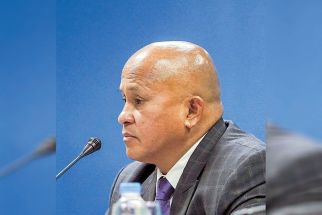Opposition slams PPC for ‘black propaganda’ on TV
May 8, 2001 | 12:00am
The opposition lambasted yesterday the People Power Coalition (PPC) for the airing of "black propaganda" on television against some of their senatorial candidates, saying it smacked of unfair election tactics.
"They are demonizing their enemies. Causing the hatred of the people is a communist tactic," said re-electionist Sen. Juan Ponce Enrile, one of the targets of the television advertisements that usually ended with the question, "Will you still vote for him?"
The advertisements presented film and audio clips inferring on the alleged participation of Enrile, Sen. Gregorio "Gringo" Honasan and former Philippine National Police chief Panfilo "Ping" Lacson in the lawless violence at Malacañang and in other questionable activities.
Former first lady and senatorial candidate Luisa Ejercito also called for the withdrawal of the advertisements, which she described as "futile attempts to derail the opposition’s landslide victory in the May 14 elections."
"Alarming are the steps this administration is taking to ensure that its candidates will win in the coming elections," she said in a statement.
"I am certain that these political ploys will not escape unnoticed by Filipinos who will revolt against these sinister efforts by delivering a landslide victory for the opposition candidates," she added.
Enrile, for his part, said he would take action against the people responsible for the "malicious" television advertisement after the elections.
He wondered if the advertisement was approved by the Commission on Elections, and if it would be considered part of the air time of the PPC.
Enrile also said the advertisements were "selective" and took out of context what he said at EDSA three or four days before the storming of Malacañang.
"What I said was that we should surround Malacañang, Villa San Miguel, ABS-CBN and Channel 7 so they can see how big our crowd is and so they can hear the complaints of the poor people," he explained.
He added that if that statement was the cause of the Mendiola violence, then the EDSA rallyists should have moved when he made the exhortation three or four days before May 1.
"Malacañang should remember that I am not their enemy. They can jail me but that will not solve their problem. I am not their problem," Enrile said.
He reiterated his denial of any participation in an alleged plot to topple the Arroyo administration.
"They have to find somebody to blame for their ineptitude, and I was the convenient scapegoat," he rued.
He said that he talked with leaders of the EDSA rally in the early morning of May 1 at a room in Galleria Suites and he sought to dissuade them from proceeding to Malacañang.
"I told them that they would not be doing any favor to Erap because people would think that Erap instigated them to march to Malacañang," Enrile recalled.
He said, however, that after some people went down to the meeting place from the 22nd floor, the mood shifted to an attack on Malacañang.
On the other hand, Lacson claimed that the media handler of then vice presidential candidate Gloria Macapagal-Arroyo was responsible for the negative advertisement.
"The PPC, with the full backing of Malacañang, has been spending millions of pesos for their propaganda campaign against me, which started from the day I announced my candidacy for the Senate," Lacson said in a statement issued by his campaign headquarters.
"They are demonizing their enemies. Causing the hatred of the people is a communist tactic," said re-electionist Sen. Juan Ponce Enrile, one of the targets of the television advertisements that usually ended with the question, "Will you still vote for him?"
The advertisements presented film and audio clips inferring on the alleged participation of Enrile, Sen. Gregorio "Gringo" Honasan and former Philippine National Police chief Panfilo "Ping" Lacson in the lawless violence at Malacañang and in other questionable activities.
Former first lady and senatorial candidate Luisa Ejercito also called for the withdrawal of the advertisements, which she described as "futile attempts to derail the opposition’s landslide victory in the May 14 elections."
"Alarming are the steps this administration is taking to ensure that its candidates will win in the coming elections," she said in a statement.
"I am certain that these political ploys will not escape unnoticed by Filipinos who will revolt against these sinister efforts by delivering a landslide victory for the opposition candidates," she added.
Enrile, for his part, said he would take action against the people responsible for the "malicious" television advertisement after the elections.
He wondered if the advertisement was approved by the Commission on Elections, and if it would be considered part of the air time of the PPC.
Enrile also said the advertisements were "selective" and took out of context what he said at EDSA three or four days before the storming of Malacañang.
"What I said was that we should surround Malacañang, Villa San Miguel, ABS-CBN and Channel 7 so they can see how big our crowd is and so they can hear the complaints of the poor people," he explained.
He added that if that statement was the cause of the Mendiola violence, then the EDSA rallyists should have moved when he made the exhortation three or four days before May 1.
"Malacañang should remember that I am not their enemy. They can jail me but that will not solve their problem. I am not their problem," Enrile said.
He reiterated his denial of any participation in an alleged plot to topple the Arroyo administration.
"They have to find somebody to blame for their ineptitude, and I was the convenient scapegoat," he rued.
He said that he talked with leaders of the EDSA rally in the early morning of May 1 at a room in Galleria Suites and he sought to dissuade them from proceeding to Malacañang.
"I told them that they would not be doing any favor to Erap because people would think that Erap instigated them to march to Malacañang," Enrile recalled.
He said, however, that after some people went down to the meeting place from the 22nd floor, the mood shifted to an attack on Malacañang.
On the other hand, Lacson claimed that the media handler of then vice presidential candidate Gloria Macapagal-Arroyo was responsible for the negative advertisement.
"The PPC, with the full backing of Malacañang, has been spending millions of pesos for their propaganda campaign against me, which started from the day I announced my candidacy for the Senate," Lacson said in a statement issued by his campaign headquarters.
BrandSpace Articles
<
>
- Latest
- Trending
Trending
Latest
Trending
Latest
Recommended
November 26, 2024 - 12:00am































